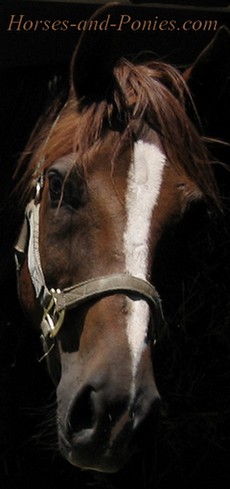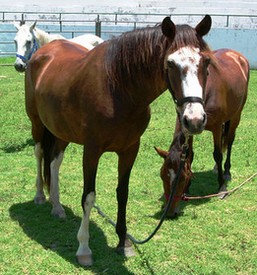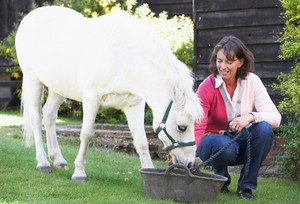 When taking riding lessons or part-boarding a horse or pony many people ask: How can I bond with this animal? This is a good question as bonding with horses makes you and the horse feel more comfortable about working together. I’ve always thought it rather rude to jump on a horse and simply begin riding. How would you like that? Many well-known trainers understand the importance of bonding. While some methods aren’t for everyone some key points are fairly universal. Pat Parelli says, “Horses don’t care how much you know until they know how much you care”.
When taking riding lessons or part-boarding a horse or pony many people ask: How can I bond with this animal? This is a good question as bonding with horses makes you and the horse feel more comfortable about working together. I’ve always thought it rather rude to jump on a horse and simply begin riding. How would you like that? Many well-known trainers understand the importance of bonding. While some methods aren’t for everyone some key points are fairly universal. Pat Parelli says, “Horses don’t care how much you know until they know how much you care”.
Grooming
Most horses love to be groomed. This is a great way to bond with a horse, and it’s also a necessary task before you ride. Massage vigorously with the curry combs, and brush gently with the body brush over the lower legs and face. Take care to touch the horse all over to help gain his trust. You could even take some time to groom when you aren’t planning to ride. Give the horse a bath! Think of the grooming experience as a way to show your horse how much you care.
Groundwork and Playing
I see so many people where the only time spent with their horse is considered “work”. They ride, exercise and train and put the horse away. How would a dog feel if you only ever interacted with it when you had a job for it to do? Over the years, horses have developed a role as work animals. They have been used as a means of transportation and carried us to war. It seems that this mentality is still held by many people today – the mentality that horses are to be used.
I spend a lot of time doing groundwork with my horses. This helps brighten up the older horse, and brings the green horse into focus. We call it ground “work”, but I add a large element of “play” into it. Horses are very curious creatures and need a chance to voice their opinion. Under saddle it is expected they will obey our every whim. So I take some time to incorporate groundwork with an emphasis on respect, play and leadership. The roundpen is a wonderful tool for working with your horse while at liberty. Or you can use a halter with a long line. There are many different methods of groundwork and most offer something of value. Just make sure that while playing you maintain your respect and dignity, as well as the horses’. Because I take the time to bond with my horses using groundwork, they regard me as more of a partner and less as a “boss”.
 Hanging Out with Horses and the Virtues of Silence
Hanging Out with Horses and the Virtues of Silence
With our very busy schedules and lifestyles that are always on the go it can difficult to enjoy the beauty in the present moment. Horses and ponies always live in the present moment, the “now”. One of my favorite things to do is listen to my horses at night, in their stalls, quietly munching their hay. They are calm and relaxed and happy.
I often “hang-out” with horses in their fields with them. I’ll wander around, petting them all one-by-one. (This is also a good opportunity to check for injuries or illness.) This helps them get used to having you around as part of the herd. You aren’t going to “catch” anyone because you’re just there to be friendly. This also helps with the catching game.
A note of caution though, as I wouldn’t recommend going into a field with numerous horses if you aren’t comfortable doing so. A lot of action can occur in the field, especially with horses you don’t know. If the property isn’t your own, make sure to get permission from the owner before entering a horse paddock or pasture. Another option would be to put your horse in an enclosed area (arena, paddock, round pen, corral) by himself.
Silence can be one of the most powerful tools we use when communicating with horses. Horses don’t understand english and although they can be taught voice commands, they generally respond to our tone more than anything. Usually when we are with our horses we are demanding something of them. Stand, whoa, go, back, faster, collect, extend etc.
If we take a few moments with them in simple silence it’s clear that in that moment we aren’t demanding or expecting anything from them. We just love them and are admiring their beauty and magnificence. Whether it’s an afternoon or a few breaks of silence among the grooming and riding, you’ll notice the bond with your horse will reach an entirely different level.
Horses and their Instincts
Despite what many people think, horses are sensitive animals. They are highly instinctual creatures that pick up various energy vibrations from quite a distance away. It has been scientifically proven that living life forms have an energy field. Due to the fact horses are prey animals and have learned to detect danger from afar, they have a highly developed sense which picks up and reads these energy fields. Human energy fields are constantly changing with our emotional, mental and physical states. So horses have a keen ability to “feel” how you are feeling at any given moment. This is why people say, “The horse will know when you’re scared”. You cannot lie to horses. Pretending does not work and will only confuse the animal as your body language will not match your energy field. This is rather unbalancing to the horse.
Simply having an understanding of how this survival skill works with horses will help the bonding process in many ways. You don’t have to take any action here – just understanding goes a long way. If your horse is acting differently around you ask yourself how you are acting or feeling different that particular day. Take a deep breath, as this physically slows your heartbeat and relaxes you which in turn will help relax the horse. I always remind my students to breathe. Check your bodylanguage and posture to make sure you aren’t acting like a predator. Horses will pick up the slightest amount of tension in your body.
 A Note on Hand Treats and Smothering
A Note on Hand Treats and Smothering
Horses are like teenagers. They prefer love from afar. They aren’t like dogs or cats and don’t like to be smothered, mothered and doted on. While it’s great to spend quality time with your horse, know when to draw the line. Try not to act like you’re walking on egg-shells around them, and don’t act like an overprotective bear. Be yourself. Just like people, horses don’t like when we try to be someone we are not.
Many people think that giving horses treats is a way to gain trust and offer friendship. Actually, quite the opposite is true. While we have the best of intentions offering carrots and apples, little do we know we’re placing ourselves below our horses in the hierarchy ladder. Horses don’t share food with each other as a sign of friendship. In fact, the more dominant horse will steal food from the horse below them in the hierarchy. By offering hand treats to horses, we’re saying, “You are the boss”. Not to mention that sweets and food in excess amounts are unhealthy for horses. And while this may seem like a quick way to gain your horses’ attention, this can lead to nipping, biting and otherwise rude behavior from the horse. Another issue with treats is the bribery factor. Dangling a carrot has no place in training. It lacks respect and is done for all the wrong reasons. Besides, it rarely works efficiently and ignores the root of the issue.
So if you must give your horse treats, do so in careful moderation. Or put it in a bucket to discourage hand nipping. And remember to add some groundwork with an emphasis on respect as well. And love your horse, but don’t smother your horse. All of your efforts will go a long way on the path of creating a lasting bond with horses and ponies.
>>by Adrianne Lake